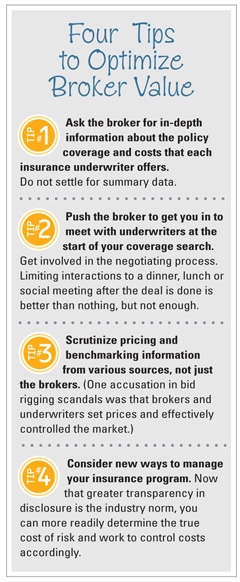 YogiBerra once quipped, “Nostalgia ain't what it used to be.”Risk managers can relate. Even though Berra was not referringto relationships with an insurance broker, he very well could have been. On top of theirmany other roles, risk managers should expect to have to justifythe current brokerage relationship to upper management, more sothan ever before.
YogiBerra once quipped, “Nostalgia ain't what it used to be.”Risk managers can relate. Even though Berra was not referringto relationships with an insurance broker, he very well could have been. On top of theirmany other roles, risk managers should expect to have to justifythe current brokerage relationship to upper management, more sothan ever before.
When risk managers “manage” the relationship with outside insurance brokers, they shouldprepare for headwinds from upper management. Bland assurances ofvalue-added relationships may not placate the top brass. C-levelexecutives and boards of directors feel heightened pressure todemonstrate transparency in all financial transactions. TheSarbanes-Oxley Act and other corporate governance initiativesrequire that directors and officers ensure that the organizationgets full value from every business relationship. This includes theinsurance brokerage arrangement. Risk managers must assure uppermanagement that the current broker is not involved in contingentcommission arrangements or bid-rigging.
|Building the Case for Broker vs. Broker
The risk manager's case for choosing one broker versus another (ormultiple “others”) must be well-thought out, rehearsed, anddistilled to a concise essence. If the risk manager wants to changebrokers, this is also a challenge that merits meticulouspreparation. The risk manager may have 10 minutes (if that) beforethe board to advocate for a certain broker or to changepartners.
In preparing the case to keep or switch insurance brokers, riskmanagers must make a convincing presentation. Expect to answerquestions from higher-ups, such as:
- “Have you put the brokerage arrangement out forcompetitive bidding?”
- “You say we are getting the best deal. Exactly how doyou know that?”
- “Should we split our insurance programs amongmultiple brokers to 'keep them honest'?”
- “Even if you are happy with the current broker, should we not consider other brokers on regularbasis, just to keep the incumbent on his or her toes?”
 These are tough questions for sure. Many risk managers maynot welcome them. They may seem intrusive and awkward.Nevertheless, even those risk managers with long-standing ties tospecific brokers may be challenged to justify and rationalize thatrelationship on financial and quantitative grounds. Generalitiescarry little weight. Historical inertia or the incumbency ofmultiple years is simply not a compelling factor to higher-ups.
These are tough questions for sure. Many risk managers maynot welcome them. They may seem intrusive and awkward.Nevertheless, even those risk managers with long-standing ties tospecific brokers may be challenged to justify and rationalize thatrelationship on financial and quantitative grounds. Generalitiescarry little weight. Historical inertia or the incumbency ofmultiple years is simply not a compelling factor to higher-ups.
Questoins toAnticipate
One reason is that organizational layers above the risk manager aretypically populated with quantitative and financial types. There isnothing wrong with this. Given their training and background,though, they will have questions that risk managers will beexpected to adequately address. Lines of questioning might resemblethe following:
- “Howmuch money has the broker saved us?”
- “What specific coverage enhancements has the brokerobtained that we could not have leveraged anyway?”
- “What exactly differentiates the incumbent brokerfrom the competition?”
- “What services do we get from the current broker that we couldnot obtain elsewhere?”
Those “soft and fuzzy” feelings do not cut it. The fact that thebroker is a friend, has had a long-standing 15-year relationshipwith the company, throws nice holiday parties, or treats you todinner at the finest steakhouse at the RIMS Conference is irrelevant to upper management.
|The moral here is that risk managers must do their homework.They must have data, specifics, examples, and vignettes to eitherjustify the existing broker relationship or make a cogent case forchange. In this “age of transparency,” expect director and officer(D&O) scrutiny into areas of the operation and brokeragerelationship into which they have never ventured before.
|Partnering with Brokers
One upshot is building good relationships with the brokeragecommunity. Burn no bridges when (and if) you must part ways.However, let brokers know the pressure you are under to justify andrationalize the relationship. Work with them to make a compellingcase to the CFO, CEO, and the board of directors. Brokers can bevital behind-the-scenes allies in building a case. In this realm,you two have common interests in staying the course.
Relationships with incumbent brokers may seem to beworking well. They may be comfortable. Though we have allheard the adage, “If it ain't broke, don't fix it,” the executivesuite and board will not view historical inertia as a reason toperpetuate even long-standing brokerage relationships. With so manyfunctions and jobs being outsourced and put out for competitivebidding, it would be naïve to think that the broker relationship isimmune to scrutiny.
|Politics may also enter the equation. Outsidecompany directors may nominate for consideration their owninsurance broker. The CEO may have corporate peers and counterpartswho advocate for other intermediaries. Risk managers should notdismiss lightly any suggestions to explore such options. The riskmanager should investigate such leads and conduct a modicum of duediligence. It shows open-mindedness to upper management,demonstrating that its recommendations receive due weight andconsideration. In some cases, it may actually unearthbetter avenues for service and cost savings to the company.
|One factor possibly making this less awkward is the fact thatmost brokers are—or should be—aware of the new business climate. Ina sense, all brokers may be paying for the sins of the few. Theymust be aware of the scrutiny under which virtually all brokers areplaced. This should engender not only sympathy with the riskmanager's plight but also motivate the broker to collaborate withthe risk manager to add value to the relationship and make it asbulletproof as possible.
|So why should risk managers care about “selling” the brokerrelationship? Reasons abound. For one, if the risk manager iscomfortable with the current broker, then making a cogent casefacilitates continuity in the risk management program. It enhancesupper management's ability to promote transparency within theorganization while reinforcing top management's confidence that therisk manager is “on top of things” and getting true value from thebroker partnership.
|Additionally, it keeps risk managers on their toes, in aconstructive way, in ensuring that key business relationshipsperpetuate on the basis of value added, not on the basis of socialties and chemistry. Finally, the discipline of regularly revisitingthe relationship can unearth genuine opportunities to haveincumbent brokers “raise their game” or to trigger a justifiedchange to explore new options.
|Berra was right in saying that “nostalgia ain't what it used tobe.” Nevertheless, by successfully selling the brokeragerelationship to upper management, risk managers heighten the oddsthat they—and their brokers—may have long-term relationships thatspawn many happy memories.
Want to continue reading?
Become a Free PropertyCasualty360 Digital Reader
Your access to unlimited PropertyCasualty360 content isn’t changing.
Once you are an ALM digital member, you’ll receive:
- All PropertyCasualty360.com news coverage, best practices, and in-depth analysis.
- Educational webcasts, resources from industry leaders, and informative newsletters.
- Other award-winning websites including BenefitsPRO.com and ThinkAdvisor.com.
Already have an account? Sign In
© 2024 ALM Global, LLC, All Rights Reserved. Request academic re-use from www.copyright.com. All other uses, submit a request to [email protected]. For more information visit Asset & Logo Licensing.








